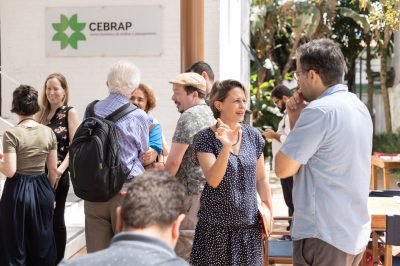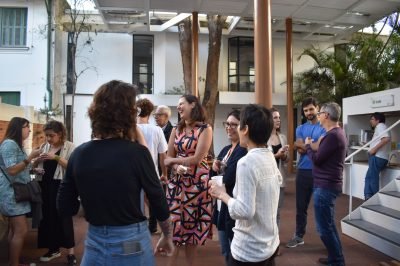The Perks and Challenges of an Interdisciplinary, Multilingual, and Multicultural Academic Environment
Global Convivial Forum
Tomaz Amorim (Academic Manager of Mecila)
Image: Ricson Onodera
Image: Marina Belisário
Mecila’s very design makes it a unique meeting point – an international, interdisciplinary space that actively fosters exchange without glossing over differences.
From basic education to academia, the demand for interdisciplinary approaches is surging. This likely stems from the recognition that today’s complex challenges – such as climate change, colonialism and neocolonialism, issues of inequality in race, gender and sexuality, etc. – require multidimensional analytical tools.
While often used interchangeably, multidisciplinarity, interdisciplinarity, and transdisciplinarity represent distinct levels of collaboration. In short: multidisciplinarity offers diverse perspectives on a broad research area; interdisciplinarity integrates viewpoints and poses shared research questions; transdisciplinarity seeks a synthesis, merging methodologies from different fields to create new, holistic approaches.
Mecila blends these levels. Its structure is multidisciplinary, drawing on diverse disciplines and institutions. Regular discussions within scientific colloquia and research areas foster interdisciplinarity through shared research goals. Finally, our annual meeting and the overarching research project embody a transdisciplinary spirit, sedimenting the results and advancing in a multilayered fashion with the broad conceptual nexus of conviviality-inequality in Latin America.
However, structure alone is not enough for meaningful collaboration across disciplines. If this collaborative work is supposed to be more than just a formality – i.e. different disciplines working in the same department – true interdisciplinarity requires a proactive exchange, both between different fields of study and among individual researchers.
Striking a balance between epistemological rigour and openness is essential for productive exchanges. By rigour, I mean upholding the core principles of one’s discipline, respecting the boundaries of the research topic, and adhering to academic standards like reproducibility and peer review. In this context, openness means acknowledging the value of diverse methodologies and approaches, even when examining similar topics. It means recognizing that different perspectives can yield varying levels of insight and that knowledge from one discipline can be adapted – through careful translation by the researcher – to benefit others.

These two poles, rigour and openness, are the precondition of work at the Centre. Without rigour, the accumulation and investigative path are lost. By deviating too much from the disciplinary boundaries themselves, the work can only talk with itself, in a language without references and possibilities of comparison and differentiation with other objects. Without openness, on the other hand, the analysis falls into a similar monolingualism, in which the view of the object is fixed and impermeable, and the discussion is reduced only to the researcher and becomes meaningless in a context of exchange.
The twin pillars of rigour and openness form the foundation for successful work in this environment. Without rigour, research loses focus and deviates into a self-referential discourse, lacking external comparison. Conversely, without openness, analysis becomes trapped in a fixed perspective, ultimately limiting the value of exchange. Monolingualism is the greatest risk for both.
Striking this delicate balance demands constant translation between researchers and a spirit of intellectual generosity. Generosity to translate the highly specialized language of the discipline itself – with the methodological subtleties often visible only to the specialist – into more general scientific terms for colleagues from other disciplines. Generosity to listen to this general translation and translate it back into the parameters of one’s discipline and its specific view of that object. Generosity to identify and suggest aspects and possibilities of readings absent in the discipline of origin and that may be useful for the approach. Finally, generosity to listen to these suggestions of methods and approaches in which the researcher has no training – which may or may not be useful! – and translate them back into the approach to the object in the context itself.
That is why the exchange takes place at the level of the disciplines, but also at the level of the individual researchers. Not that researchers need to be congenial or close friends – although that helps. But the process of listening and translating between disciplines requires this active attitude on the part of the researchers that I am calling generosity. This generosity presupposes trust and a certain epistemological risk of leaving the circles of the discipline itself for the benefit of the object and the exchange.

Building the trust essential for collaboration unfolds in the routines of daily life. Like mastering a new language, it requires immersion – not only in the methods of other disciplines but also in the unique thought patterns and communication styles of individual researchers. Years spent honing expertise naturally create some scepticism about simplifying specialized language. However, successful exchange reveals that the object is not made simpler but becomes richer. Translation and adaptation provide new tools, leading to a more complex and nuanced understanding. One does not lose their voice but gains vocabulary and accents for even more sophisticated communication.
I spoke about the level of conviviality between disciplines and researchers, which also presupposes a cultural, linguistic, and political coexistence. But one could ask, to whom is the possibility of this multilingualism offered, especially in contexts as unequal as those of Latin America? The rule of English as an academic language, the cosmopolitanism of world views only offered to the high classes of the great centres, and the hierarchization between cultures which are considered more or less civilized. All of this creates inequalities in the way in which academic dialogue is constructed and operates. In other words, even in self-declared interdisciplinary centres, the exchange between disciplines and forms of knowledge takes place in unequal contexts.
In this sense, and to not be naive, it is important to highlight that generosity has what we can generically call “resistance” as its fundamental counterpart, almost as a counter-principle. Resistance against the silent or not-so-silent cooptation, resistance as a form of protection of one’s own cultural and epistemic specificities, resistance as a constant negotiation of boundaries, always taking into account this unequal context.
This resistance operates on many levels: scientific, cultural, linguistic and also political. In an international research center which is a partnership between German and Latin American institutions, geopolitical issues also often come into play, especially considering the very different political history, close alliances, and economic interests (green energy, migration, and the wars in Gaza and Ukraine are urgent examples). The democratic assumptions of coexistence and communication are often put at stake. (In certain contexts, even scientific freedom is called into question, when certain lines of research or objects are considered offensive to the status quo!)
The only way to navigate these complexities, which exist globally yet impact us locally, is through open dialogue. We need secure spaces for exchange, where a balance between generosity and resistance can be carefully negotiated. This includes continually examining the intersection of personal convictions with the principles of rigour and openness.
True richness in exchange emerges from the points of greatest difficulty. In this sense, Mecila’s very design makes it a unique meeting point – an international, interdisciplinary space that actively fosters exchange without glossing over differences. It is a place where diverse individuals choose to engage in conversations increasingly rare within institutional or national borders. The São Paulo Office embraces the challenge of creating a safe environment for critical, urgent discussions that do not shy away from differences.
This goes beyond managing resources, logistics, and events (though those tasks, done by my colleagues across São Paulo, Berlin, and Cologne, are essential and often invisible!). It is about mediating across epistemological, political, and personal divides and discovering new possibilities for collaboration. This mediation is a cornerstone of our work.
